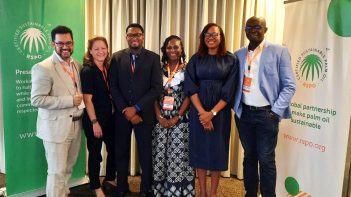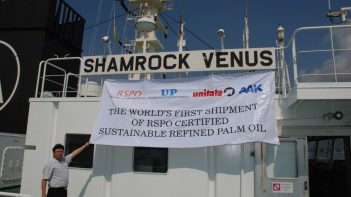40% of global palm oil is produced by smallholders. Their contribution to implement a sustainable approach is the key to realize the sustainable path for palm oil. To pursue its vision to make sustainable palm oil as norm, the RSPO supports more and more smallholders to be RSPO certified to increase palm oil production by using less land, raising levels of income among poor farmers and reducing risk of land conversion which threatens forests and biodiversity.
To realise these smallholders’ journey towards certified sustainable palm oil, RSPO Indonesia has recently organised a Train the Trainers for Smallholder Facilitator 2015 to encounter the needs of preparing smallholder facilitators on the process of guiding smallholders towards RSPO certification. Held in Bogor, Indonesia, the 5-days training was the fourth held after the first training was initiated in 2010.
Aiming to provide smallholder facilitators a better knowledge and understanding on preparation stages and audit process of RSPO certification by independent smallholders, the training was attended by 43 delegates from various stakeholders who worked with independent smallholders throughout Indonesia, including the smallholders themselves, potential group managers of smallholder organizations, RSPO members, consultants, and NGOs.
The training was aimed at imparting deeper understanding on RSPO Principles & Criteria and smallholder standards, as well as to prepare qualified trainers for smallholders to have more partners on the ground who would be working closely with them. The training also covered topics related to group and organization management, providing participants sufficient skills to play the role as trainer/facilitator for smallholders and to create profound understanding on how to develop organization, understand steps required in preparing smallholder certification and key strategies to maintain RSPO group certificate.
Various topics were presented, ranging from legality aspects of palm oil, methods of group dynamics, communication techniques, smallholder group organization, audit system for group certification, good agricultural practice, RSPO Principles & Criteria, including in depth elaboration on Free Prior Informed Consent (FPIC) and High Conservation Value (HCV), with numerous expert facilitators from the agricultural practice such as RSPO, FASDA (District Facilitator), Sawit Watch, Wetlands International, British Standards Institutions, LINKS, SNV World, Enclude Solutions, BioCERT, Yayasan SETARA, and Dinas Koperasi & UMKM Kota Bogor.
Desi Kusumadewi, RSPO Indonesia Director in her closing speech said that “certification should not become the final destination in the path towards sustainability. It is rather a tool to verify and confirm one's compliance to the standard. What matters the most is the journey after getting the certification – whether the implementation of the sustainability standard brings positive impact to the economy, environment and social aspects of the farmers and communities surrounding the plantations.”
Keep reading
Call for Proposal: Study on Wild Palms in West and Central Africa

RSPO hosts first Africa downstream sustainable palm oil supply chain forum in Cape Town

Nearly two decades on, Europe continues to drive global demand for RSPO Certified Palm Oil

Communicating Sustainable Palm Oil - examples of success across Europe
[EOT] Terms of Reference: Independent Smallholders Outreach Programme in Indonesia

RT2023 Delegates Propose Solutions to Reinforce RSPO’s Assurance System – End-Year Highlights of Assurance Standing Committee
RSPO UK Members' Day Examines Shifting Dynamics of Doing Business within Europe

Celebrating 20 Years of RSPO’s Sustainability Journey




